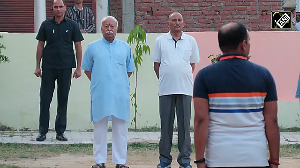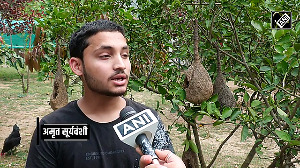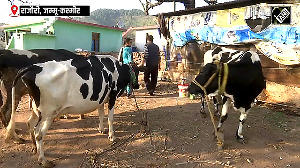"If winter comes, can spring be far behind?"
Those words suit Indian tennis in the year 2002 to the hilt.
It was the year in which the country's doubles pair of Leander Paes and Mahesh Bhupathi split for the second time and perhaps forever, but also one that witnessed the emergence of a couple of young talent who will be talked and written about in the coming years.
The success of Paes and Bhupathi, when they won three Grand Slams and reigned doubles tennis as number one for a brief period, was a saga that had few parallels in Indian sport. For the sheer amount of interest they generated in the game through their heroics on the court, their achievement should rank second only to what Vishwanathan Anand has done to chess in this country.
Considering this, their bitter rivalry, is bound to result in a fallout. Critics already talk about the bi-polarisation of Indian tennis, a sad development in which burgeoning talent is being identified as belonging to two different camps based on their coaches and academies. It is something that the game in this country, which is already lacking idols to inspire youngsters, could do without.
A sample of what is in store for India when Paes and Bhupathi will no more join hands was seen in September when the team lost 5-0 to Australia in the Davis Cup, for the third consecutive time in the play-off match for the World Group stage.
Not that Paes and Bhupathi would have blown away the mighty Aussies. But in the absence of the confidence and self-belief that their combined presence had breathed through all these years, the team lost without an iota of resistance, being swept away Lleyton Hewitt and Co.
Not even Paes, who despite his low singles rankings had always played inspired tennis for the country, could recreate his Davis Cup magic in Adelaide.
Only in April at Wellington, Paes, in the company of Bhupathi, had helped India beat New Zealand without much ado to top the Asia-Oceania group while also achieving the
personal milestone of most number of victories in Davis Cup history. But against Australia, he looked a pale shadow of his former self.
The Aussies, experts in gamesmanship they are, tried to kick up dirt by questioning Bhupathi's commitment and cited the Indian's historic win at the US Open less than two weeks ago. But Bhupathi maintained that his decision not to play was a truly professional one.
His doctor advised two weeks rest for the sore shoulder at the end of season's last Grand Slam, and the Indian, first to win US Open doubles crown, opted to play the Asian Games in Busan where he said the chance of his winning a medal in partnership with Paes was more than beating the higher-ranked Australians on their own soil.
True to his word, Bhupathi partnered Paes two weeks later at the Asian Games to win the men's doubles gold, and a silver with Manisha Malhotra in the mixed doubles.
Another consequence of the split between the two star players was the impact it had on their individual careers. Even as Bhupathi moved up one rung after the other, capping
his rise with the US Open win in the company of Max Mirnyi of Belarus, Paes' struggled. He struggled to find a stable partner throughout the season, and that affected his singles schedule too.
"It only goes to show that both of us are good players even without each other. And I am happy I could prove myself," Bhupathi said after his US Open victory.
But the latter half of 2002 proved to be much better that the first for Indian tennis. And more than the established players, it had to do with the new bunch of next-generation players. The loss to the Australians aside, tennis gave India a gold and silver and two bronze medals at Busan.
Besides the doubles gold, Bhupathi and Paes won silver and bronze respectively in the mixed doubles with Manisha Malhotra and Sania Mirza. And the men's second doubles pairing of Mustafa Ghouse and Vishal Uppal claimed the other bronze.
The performances of the juniors too nurtured hope for the future. The Indian Under-14 boys and girls teams both finished a creditable seventh in the World Junior Championships conducted by the ITF. While the boys won the Asia-Oceania zone before moving in to the finals, the girls finished third in the zonal stage. That both the teams beat fancied teams like Australia and Spain speaks volume for the talent base in the country.







 © 2025
© 2025